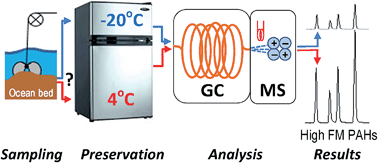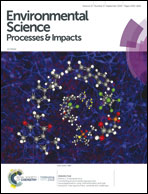To freeze, or not to freeze: the impact of subzero temperature on quantifying organic contaminants in ocean sediments
Abstract
Assessing the extent of ocean bed contamination by anthropogenic organic chemicals requires collecting and preserving the native state of sediments. The latter is particularly important since most sediment analyses are performed away from the sites of samples collection. Preservation, however, is presumptuous since commonly used sediment handling practices such as freezing are structurally disruptive, the impacts of which are not well understood. In this study, the impact of freezing on quantifying the total organic carbon (TOC) contents and the extent of PAH, DDT and PCB contamination in 17 split-paired sediment samples was investigated. The samples were collected from the Santa Monica Bay, California (USA). One-half of each split-pair was frozen at −20 °C and the other half was refrigerated at 4 °C for up to 11 days. The results suggest that no significant differences exist between the frozen and the refrigerated datasets for PCBs (F1,28 = 4.01, p > 0.05), DDTs (n = 16, t-Stat < t-Critical, p > 0.05) or TOC (n = 16, t-Stat < t-Critical, p > 0.05). The results however show that less PAHs were detected in the frozen sediments (F1,24 = 8.18, p < 0.05) than in the refrigerated sediments; the larger PAHs were affected the most. Interestingly, while benzo[a]pyrene, a large PAH molecule, was affected by this apparent temperature-induced difference, its structural isomer, benzo[e]pyrene, was not. Even more interesting was the finding that while non-coplanar PCBs were affected similarly, the coplanar PCBs were not. Overall, sediment freezing within this study's timeframe appears to offer little contextual advantage over sediment refrigeration.



 Please wait while we load your content...
Please wait while we load your content...